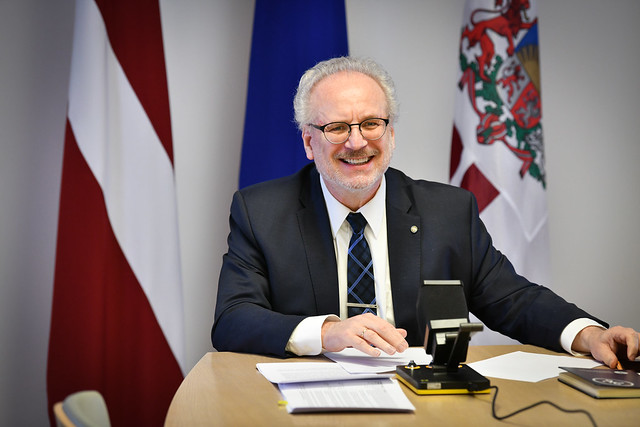Minister Vitenbergs pointed out that Ministry of Economics (MoE) and Ministry of Finance (MoF) have agreed on support criteria necessary to expand the scope of beneficiaries. Egils Levits urged Minister to include utility and renting costs in the amount of available state support to help companies that have suffered from either temporary suspension or significant reduction of activity due to imposed restrictions.
On the scale of retail restrictions, President of Latvia reminded people and retail businesses about the need to act responsibly and respect the current restrictions: ‘After several weeks of very strict COVID-19 restrictions, curve has been flattened. However, looking at Ireland, for example, we can see that early lifting of restrictions may be catastrophic. We must remain patient and avoid premature lifting of restrictions. If we want the best for ourselves this spring and summer, we as a society need to endure just a little bit more – wait for immunisation programme to pick up the pace and restrictions to start working. Curve must start going down. As soon as number of cases starts going down steadily, and hopefully that will happen soon, we will be able to carefully adjust various retail and other restrictions to make them easier. But it would not be wise to reduce retail restrictions completely, immediately or quickly. That is why we still need to wait a little more.’
President of Latvia also underlined the need for long-term plans detailing how restrictions will change depending on the COVID-19 curve. Changing support criteria and restrictions may be confusing to people. A clearer communication is needed altogether to reassure businesses and people. On Tuesday, Cabinet of Ministers will discuss retail safety guidelines for coming months, said Jānis Vitenbergs.
President and Economics Minister then moved on to cooperation between the Ministry of Economics, Ministry of Finance and development finance institution ALTUM and Latvian Investment and Development Agency on the national plan for dynamic recovery and export policy supporting recovery from COVID-19 crisis. President Levits and Minister Vitenbergs both stressed the importance of banks helping businesses overcome current difficulties.
One of the main topics of the meeting was exit from the crisis and investments from European Union (EU) Recovery and Resilience Facility. Egils Levits asked Minister Vitenbergs to provide an overview of the activities implemented under 2023 Strategy for Latvia for Mitigation of the Consequences of the Crisis Caused by Covid-19 delivered by the Ministry of Economics this spring. President specifically underlined that the additional funding available to Latvia should not be used only to fill gaps widened by the virus. Precisely targeted investments in each sector should transform Latvian economy and bring it to a new level. We need a transparent, professional and strategically driven, industry-lobby-free master plan on how to transform the Latvian economy with clearly defined specific guidelines ensuring investment efficiency. Independent experts should contribute the overall vision of the future economy of Latvia. It cannot be based only on narrow interests of each specific field.
Each recovery and resilience plan of Latvia will have to include a minimum of 37% of expenditure related to climate and a minimum of 20% of expenditure to foster the digital transition to be funded from EU Recovery and Resilience Facility. According to President Levits, Latvia will have to come up with a clear digital transformation plan, which has far reaching development implications for industries, to make its programmes fit this goal.
President of Latvia also proposed improvements in the public procurement system. He suggested to make all public procurements green by default. Green public procurements would not apply only to exceptional cases that would require other arrangements. According to Minister Vitenbergs, this is a very good proposal. Latvia should also couple growth with climate neutrality.
Egils Levits and Jānis Vitenbergs also talked about employment and reskilling policies for economic recovery. President asked the Minister about government reskilling plans to guarantee the labour force in expanding sectors. Minister said that policies are too fragmented, and there are training and reskilling programmes that are being delivered, including programmes implemented in cooperation with vocational educational establishments and private sector employers. According to Jānis Vitenbergs, Latvia needs an integrated approach to labour market reskilling policies and identification of strategic professions.
President Levits pointed out that regular auditing of employment governance system would lead to better reskilling and re-employment policies. According to Minister Vitenbergs, OECD report on policy actions for housing affordability in Latvia is a good example of how such audit-based approach can lead to new policies for better future.





